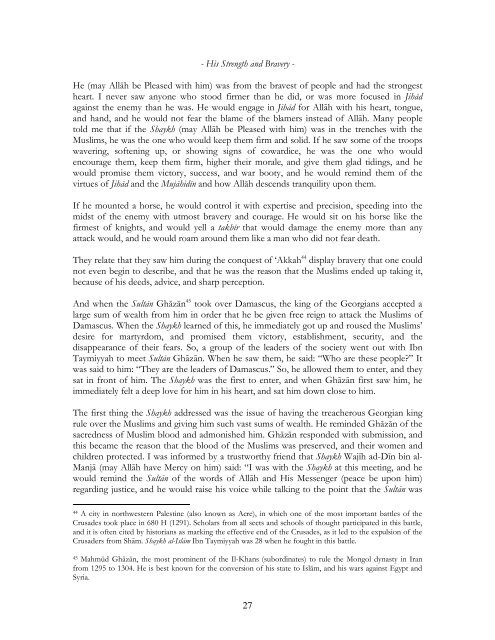The Lofty Virtues Of Ibn Taymiyyah
Many more Islamic media to read, listen, print and download at ww.IslamicGlobe.com and at www.QuranReciter.org
Many more Islamic media to read, listen, print and download at
ww.IslamicGlobe.com and at www.QuranReciter.org
Create successful ePaper yourself
Turn your PDF publications into a flip-book with our unique Google optimized e-Paper software.
- His Strength and Bravery -<br />
He (may Allāh be Pleased with him) was from the bravest of people and had the strongest<br />
heart. I never saw anyone who stood firmer than he did, or was more focused in Jihād<br />
against the enemy than he was. He would engage in Jihād for Allāh with his heart, tongue,<br />
and hand, and he would not fear the blame of the blamers instead of Allāh. Many people<br />
told me that if the Shaykh (may Allāh be Pleased with him) was in the trenches with the<br />
Muslims, he was the one who would keep them firm and solid. If he saw some of the troops<br />
wavering, softening up, or showing signs of cowardice, he was the one who would<br />
encourage them, keep them firm, higher their morale, and give them glad tidings, and he<br />
would promise them victory, success, and war booty, and he would remind them of the<br />
virtues of Jihād and the Mujāhidīn and how Allāh descends tranquility upon them.<br />
If he mounted a horse, he would control it with expertise and precision, speeding into the<br />
midst of the enemy with utmost bravery and courage. He would sit on his horse like the<br />
firmest of knights, and would yell a takbīr that would damage the enemy more than any<br />
attack would, and he would roam around them like a man who did not fear death.<br />
<strong>The</strong>y relate that they saw him during the conquest of ‘Akkah 44 display bravery that one could<br />
not even begin to describe, and that he was the reason that the Muslims ended up taking it,<br />
because of his deeds, advice, and sharp perception.<br />
And when the Sultān Ghāzān 45 took over Damascus, the king of the Georgians accepted a<br />
large sum of wealth from him in order that he be given free reign to attack the Muslims of<br />
Damascus. When the Shaykh learned of this, he immediately got up and roused the Muslims’<br />
desire for martyrdom, and promised them victory, establishment, security, and the<br />
disappearance of their fears. So, a group of the leaders of the society went out with <strong>Ibn</strong><br />
<strong>Taymiyyah</strong> to meet Sultān Ghāzān. When he saw them, he said: “Who are these people?” It<br />
was said to him: “<strong>The</strong>y are the leaders of Damascus.” So, he allowed them to enter, and they<br />
sat in front of him. <strong>The</strong> Shaykh was the first to enter, and when Ghāzān first saw him, he<br />
immediately felt a deep love for him in his heart, and sat him down close to him.<br />
<strong>The</strong> first thing the Shaykh addressed was the issue of having the treacherous Georgian king<br />
rule over the Muslims and giving him such vast sums of wealth. He reminded Ghāzān of the<br />
sacredness of Muslim blood and admonished him. Ghāzān responded with submission, and<br />
this became the reason that the blood of the Muslims was preserved, and their women and<br />
children protected. I was informed by a trustworthy friend that Shaykh Wajīh ad-Dīn bin al-<br />
Manjā (may Allāh have Mercy on him) said: “I was with the Shaykh at this meeting, and he<br />
would remind the Sultān of the words of Allāh and His Messenger (peace be upon him)<br />
regarding justice, and he would raise his voice while talking to the point that the Sultān was<br />
44 A city in northwestern Palestine (also known as Acre), in which one of the most important battles of the<br />
Crusades took place in 680 H (1291). Scholars from all sects and schools of thought participated in this battle,<br />
and it is often cited by historians as marking the effective end of the Crusades, as it led to the expulsion of the<br />
Crusaders from Shām. Shaykh al-Islām <strong>Ibn</strong> <strong>Taymiyyah</strong> was 28 when he fought in this battle.<br />
45 Mahmūd Ghāzān, the most prominent of the Il-Khans (subordinates) to rule the Mongol dynasty in Iran<br />
from 1295 to 1304. He is best known for the conversion of his state to Islām, and his wars against Egypt and<br />
Syria.<br />
27














